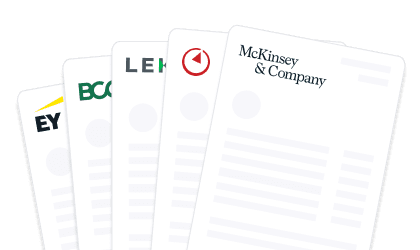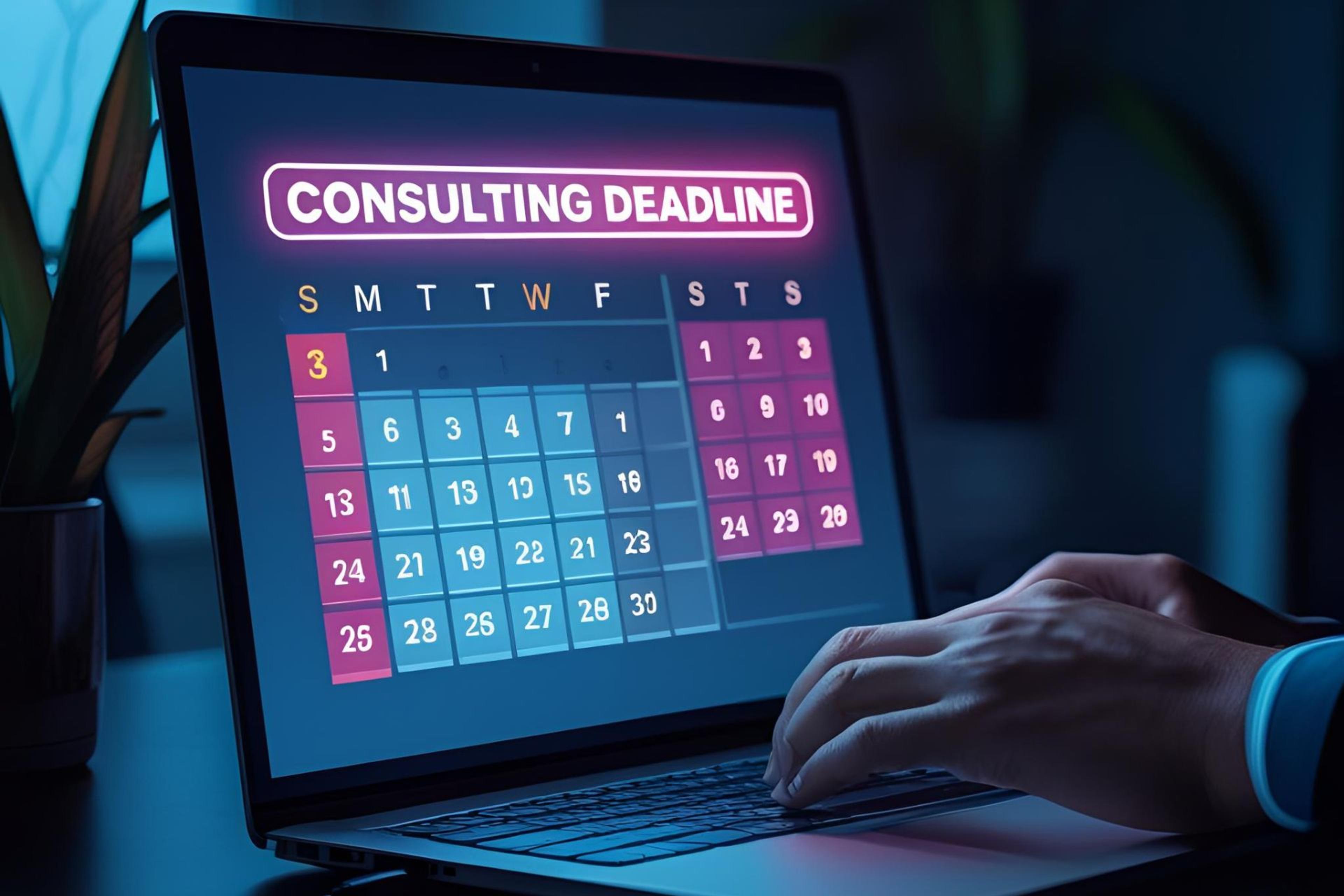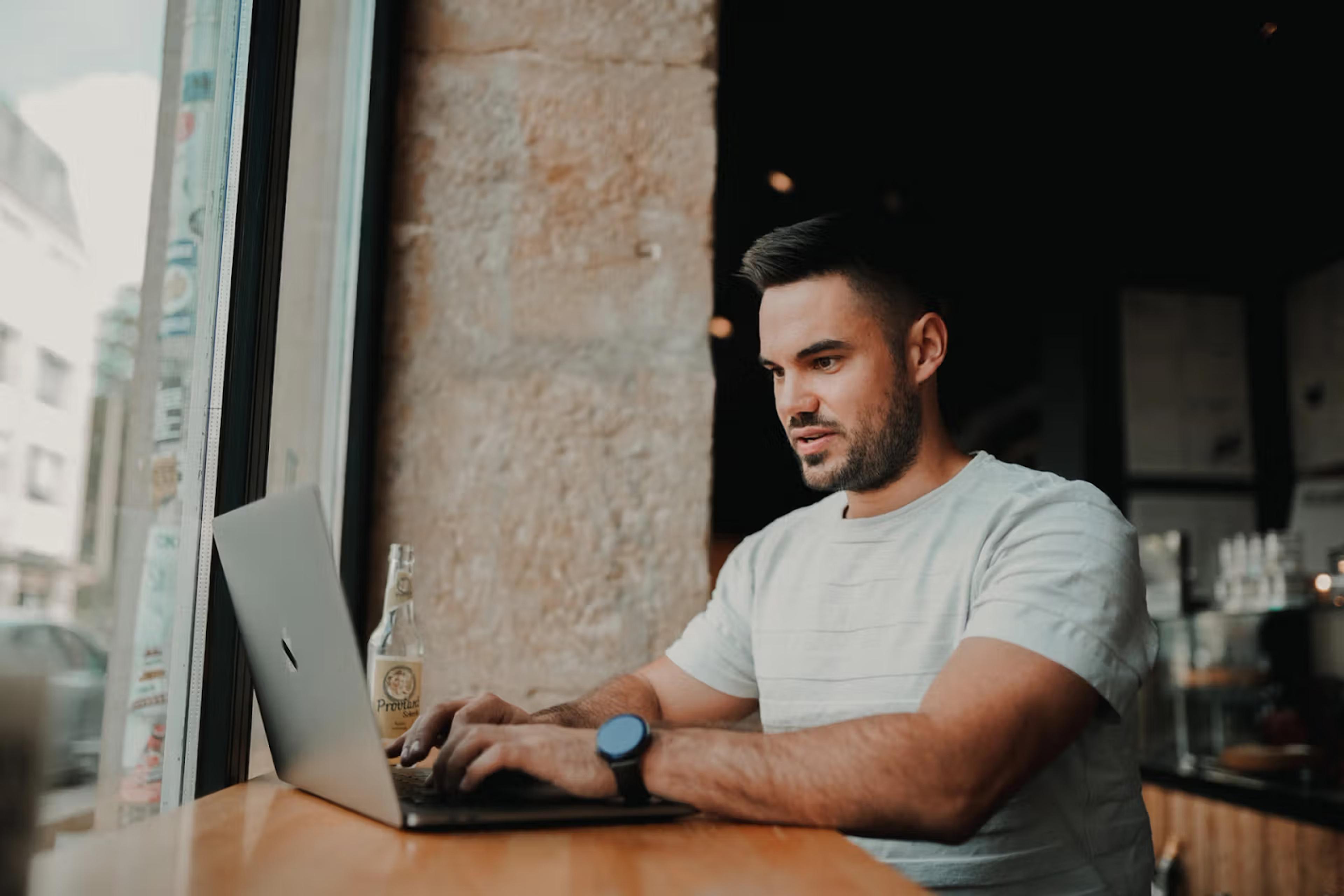Top 10 Questions to Ask in a Consulting Interview
Stand out by learning the right questions to ask in a consulting interview. Get expert-backed examples, tips, and real insights from former MBB interviewers.
Posted September 25, 2025

Join a free event
Learn from top coaches and industry experts in live, interactive sessions you can join for free.
Table of Contents
You've made it to the interview! Now it's your turn to ask the questions. What you ask at the end of a consulting interview can say just as much about you as your answers did. Great candidates don’t just nod along; they ask insightful questions that show they’re genuinely interested in the firm, the work, and the people.
To help you stand out, we’ve compiled 10 expert-recommended questions to ask in a consulting interview. Ones that go beyond a quick Google search or the same questions everyone else asks. These are drawn from top consulting firms' best practices, real candidate experiences, and input from current consultants on Reddit.
Why Your Questions Matter
Consulting firms aren’t just evaluating your case interview or fit interview responses; they’re also looking at how you engage in conversation. Are you curious? Are you thoughtful? Do you understand the role and what consulting projects actually involve?
Asking good questions demonstrates communication skills, problem-solving skills, and your ability to build relationships, which are all critical in a consulting job. And most importantly, it helps you assess whether this firm, team, or office is the right fit for you.
Real-world insight: “I always remember candidates who ask thoughtful questions about the work or team culture. It shows they’re not just trying to get a job, but the right one.” – Former Bain Manager
Read: Consulting Case Interview Guide – With Examples (2025)
Top Questions to Ask in a Consulting Interview (And Why They Work)
These aren't your typical “what’s your favorite part of the job?” throwaways. Each question below is designed to spark a genuine conversation with your interviewer, help you gather real insights about the firm and team, and leave a positive, memorable impression.
Let’s break them down with expert framing, Reddit insights, and real consulting context.
1. What types of consulting projects have you worked on recently, and which stood out the most?
Why it works: This opens the door to meaningful storytelling. You’ll get real insight into the types of industries, clients, and problems the interviewer works on beyond what’s listed on the website.
Pro Tip: If you're targeting a particular industry, listen for overlaps and follow up with: “What made that project particularly memorable?”
Reddit Insight: Consultants say this often triggers engaging back-and-forth, especially when candidates ask about their role or lessons learned.
2. How do teams typically collaborate on a challenging case?
Why it works: This shows you care about teamwork, resilience, and how problems are actually solved, not just the “glossy” version of the work.
Follow-up: “What’s the most challenging case you’ve been on, and how did the team navigate it?”
This gives you a real-world perspective on how the firm supports problem-solving, communication, and high-pressure collaboration.
3. What do the most successful consultants here do differently?
Why it works: This shows ambition and coachability. You're signaling that you're not just here to get the job; you want to excel.
Frame it like this: “From your perspective, what separates high performers from everyone else?”
If you're speaking to a manager, this can surface unspoken traits the firm values like leadership style, communication nuance, or ownership mindset.
4. How has your team evolved with AI, automation, or other emerging tech?
Why it works: You’ll stand out as someone who’s thinking about the future of the industry, not just today’s role. This question works especially well if you're coming from a technical or data-heavy background.
Consultants increasingly work on digital transformation and AI-related strategy; this shows you're already tracking the trend.
5. What’s the typical career path for someone in this consulting role?
Why it works: Consulting firms want long-term thinkers. This question signals that you're intentional about your trajectory.
Make it personal: “I’d love to understand the most common paths from this role and how flexible they are based on interests or strengths.”
If your interviewer transferred between offices or industries, ask how they navigated it.
Read: Paths Into Consulting: Target, Non-Target, & Experienced Hire (Post-Grad)
6. What are the biggest opportunities or challenges your team is tackling right now?
Why it works: You’re shifting from abstract interview questions to real-time, real-firm context. This shows you're thinking like a consultant: problem → insight → solution.
Follow up: “How is the team thinking about solving for that?” or “Has this been a shift in client needs?”
7. How does your office support consultants who want to focus on a specific industry or client type?
Why it works: Whether you’re passionate about healthcare, tech, or sustainability, this question shows depth and foresight.
If you don’t yet have a focus, use this to learn how much flexibility you'll have early on and how consultants gain exposure before specializing.
8. From your side as an interviewer, what’s the recruiting process really like?
Why it works: This is a sharp meta-question. It shows empathy, curiosity, and interest in the human side of the hiring process.
Ask this with humility. You’ll often get rare insight into what interviewers look for beyond the case: confidence, clarity, coachability, etc.
9. How does the firm help new consultants get up to speed quickly?
Why it works: Consulting is a steep learning curve. This question shows you’re proactive, self-aware, and already thinking about how to ramp effectively.
Pair this with a comment like: “I know the early months are intense. What kind of mentorship or training made the biggest difference for you?”
10. What’s a question you wish more candidates asked at the end of a consulting interview?
Why it works: This invites reflection and helps you stand out as someone who cares about connection, not just performance.
Real-World Insight: Consultants say this question often leads to a more relaxed, authentic conversation, especially if your interviewer has been in “scripted” mode all day.
How to Prepare for Consulting Interviews (Like a Top 1% Candidate)
Over the past decade, we’ve coached thousands of candidates into firms like McKinsey, BCG, and Bain. The most successful candidates don’t just “do a few mock cases” but prepare with intentional structure, strategic feedback, and real-time pressure. Here’s what that looks like.
1. Start with solo prep to build fundamentals
Before jumping into case drills, you need to understand the mechanics of the interview process: case structure, fit interview expectations, and what interviewers are really evaluating.
Here’s what solo prep should include:
- Study case frameworks and common problem types (profitability, market entry, M&A)
- Watch high-quality mock interviews and breakdowns
- Practice structuring cases out loud and summarizing insights clearly
- Use reflection prompts to prep stories for behavioral/fit questions
But: Solo prep alone won’t prepare you for pressure, pushback, or unpredictable follow-ups. That’s where live practice becomes essential.
2. Practice with peers, but be strategic
Peer practice is a useful bridge between solo study and expert coaching. It gives you a chance to simulate dialogue and test your communication under light pressure.
However, many candidates hit a ceiling here:
- Peers often lack the expertise to give precise, actionable feedback
- Feedback quality is inconsistent and sometimes outright incorrect
- Scheduling can be unreliable (especially on open prep platforms)
Tip: Use peer practice to build confidence and consistency, but don’t rely on it as your primary prep method. Most top-performing candidates use it to refine, not define, their strategy.
3. Level up with expert coaching (this is what separates serious candidates)
Practicing with a former MBB interviewer changes everything. You get real-time pressure, targeted feedback, and firm-specific insight that peer prep can’t replicate.
Here’s what top candidates gain from working with an expert:
- Realistic, high-pressure simulations of actual MBB interviews
- Detailed feedback on communication, problem-solving, and executive presence
- Correction of subtle habits that peers often miss
- Calibration of answers to what specific firms prioritize
- Coaching on how to tailor stories, frame questions, and handle ambiguity
The ROI is enormous: For many candidates, a $500–700 investment in expert prep leads to offers with $50K+ in increased compensation. That’s a 100x return and the difference between landing a job or getting cut late in the process.
Read: Top 5 Tips on Breaking Into Consulting (From an Ex-Bain Interviewer)
Book a consulting interview coach to get personalized feedback and accelerate your prep.
Common Mistakes to Avoid When Asking Questions
Even strong candidates lose points by asking poorly framed questions. Here’s what to steer clear of:
- Asking overly basic or wrong questions that show you didn’t do your homework or even skim the firm’s website.
- Getting too personal or off-topic can come across as tone-deaf or inappropriate in a professional setting.
- Repeating questions the interviewer already answered, signaling you weren’t actively listening.
- Firing off a checklist of questions without context makes you seem scripted rather than genuinely curious.
How to Ask Better Questions in Your Consulting Interview
Great candidates don’t just survive the interview; they turn it into a two-way conversation. The questions you ask reflect your preparation, curiosity, and ability to engage as a future consultant. They aren’t just a formality. They’re part of how you’re evaluated.
Here’s how to approach them with purpose and precision.
Do targeted research ahead of time
Generic prep leads to generic questions. Before your interview, go beyond the firm's homepage. Read recent thought leadership, review case studies relevant to your industry interests, and check for press releases, office-specific initiatives, or alumni panels. If you know your interviewer’s name in advance, research their background and find potential connection points.
This kind of prep helps you avoid asking surface-level questions and shows that you’re genuinely interested in the work this firm is doing. It also allows you to tailor your questions in a way that demonstrates insight and initiative.
Build a list of questions, but personalize them in the moment
Create a short list of thoughtful questions in advance, but don’t treat it as a script. A strong candidate listens closely throughout the interview and uses what the interviewer says to guide the flow of the conversation. If the interviewer mentions a recent project or firm initiative, tailor your question accordingly. This flexibility shows maturity and engagement.
Organize your questions around major themes like industry focus, team culture, client engagement, or long-term career growth. Having a few go-to areas of interest will help you adapt naturally, no matter how much time you have at the end.
Ask specific, open-ended questions
Avoid vague or overly broad questions like “What’s the culture like?” These tend to produce a rehearsed interviewer’s answer and don’t give you much insight. Instead, frame your questions to invite real examples and reflection. Ask about moments when culture shaped a project, or how the team handled a recent challenge. Specificity leads to more memorable answers, and it shows you’ve thought carefully about what you want to know.
Show interest in the interviewer’s experiences
Consultants are often proud of the work they’ve done and the teams they’ve been part of. Give them a chance to share their own story. Ask what kinds of projects have been most rewarding, or how their role has evolved over time. This creates a more personal, authentic exchange and gives you unfiltered insight into life at the firm.
Questions like these often turn the conversation into something more human. That’s what interviewers remember.
Save your best questions for the end and close with purpose
When the interviewer invites questions at the end, don’t hold back. This is your final chance to leave a strong, positive impression. Choose one or two relevant questions that reflect your research and curiosity. Focus on those that spark a real conversation, not just a checklist response.
After you’ve asked your final question, thank your interviewer for their time and candor. A confident, thoughtful close reinforces that you’re not only well-prepared but ready to be a peer in the room.
Pro Tip: Don’t Force It, Ask With Intent
The best questions come from genuine curiosity, not from trying to impress. If you’ve spent hours preparing for your consulting interview, as most serious candidates do, your questions should reflect that thoughtfulness and depth.
- Ask what you actually want to know about the work, team, or culture, not what you think sounds impressive.
- Let the conversation guide you. If the interviewer shares something unexpected, follow up. That’s how real dialogue happens.
- Be selective. Prioritize quality over quantity, especially if time is tight.
Reddit insight: One consultant shared, “The most memorable conversations are with candidates who seem genuinely interested in my work and experiences, not just asking to check a box.” Interviewers know when you’re going through the motions. Ask with purpose.
What Actually Sets You Apart
Anyone can rehearse a case. What sets top candidates apart is their ability to ask relevant, thoughtful questions that show they’re already thinking like a consultant, curious, strategic, and prepared to engage.
Asking smart questions communicates more than interest. It shows maturity, communication skills, and a real understanding of what the job entails.
When preparing your list, focus on questions that:
- Are directly tied to your goals or interests within the firm
- Reflect real research about the firm, the interviewer, or the industry
- Invite a deeper conversation, not just a one-line answer
This isn’t about impressing your interviewer. It’s about building a genuine connection and showing you belong in the room.
Bonus: What to Ask in the Next Round
If you're moving to a second or final round, your questions need to evolve. By now, you've likely covered the basics; now is the time to ask deeper, more strategic questions that reflect your growing understanding of the firm and your long-term fit.
At this stage, consider asking about:
1. How does this firm compare to other top consulting firms in terms of culture, staffing model, or post-consulting exits?
Example: “I’d love to hear your perspective on what sets this firm apart from others you considered or worked at.”
2. How the firm supports sustainable performance, especially in high-intensity periods. This is a more thoughtful way to ask about long hours and work-life balance without sounding disengaged.
Example: “What structures or norms help teams manage high-demand periods while staying effective and supported?”
3. Opportunities for internal mobility across offices, industries, or functions. This shows long-term thinking and interest in growing within the firm.
Example: “How common is it for consultants to switch practice areas or pursue office transfers as they grow here?”
Pro tip: Tailor your questions based on who you’re speaking with. Partners can speak to firm direction and long-term growth. Managers can share how teams are run. Associates or analysts can give honest insight into day-to-day life.
Second-round interviews are often more conversational. Use that to your advantage and ask smarter questions, build rapport, and show you're thinking several steps ahead.
Final Thoughts
Consulting interviews are designed to test more than your analytical skills; they're a measure of how you think, communicate, and connect under pressure. Top candidates don’t just answer questions well. They ask the right questions, ones that show curiosity, maturity, and the ability to engage like a future consultant.
When you ask with intention, you do more than gather information. You shape the conversation, signal your potential as a teammate and problem-solver, and leave behind something far more lasting than a well-rehearsed case.
In a room full of sharp resumes, it’s your questions and how you ask them that often set you apart.
Coaching Can Help You Nail the Interview
Want expert feedback on your questions, answers, and overall interview strategy? Leland’s consulting coaches include ex-interviewers from McKinsey, BCG, Bain, and other consulting firms. They can help you refine your approach and avoid common mistakes.
Work with a top consulting coach 1-on-1 to practice asking and answering questions that make you stand out. Also, check out our management consulting recruiting bootcamp and free management consulting events for more strategic insights!
See: The 10 Best Consulting Coaches for Case Interviews & Resumes (2025)
Read next:
- Consulting Recruiting Timeline: Dates, Deadlines & Strategy
- List of Consulting Deadlines for MBB & Big 4
- How to Write a Consulting Cover Letter (Template + Examples from MBB Admits)
- 50+ Case Interview Questions & Examples (MBB + Other Top Firms)
- How to Prepare for a Bain Case Interview
- McKinsey PEI Questions: Common Questions & Answers
- Case Interview Frameworks & When to Use Them
- Consulting Coffee Chats: The Ultimate Guide [2025]
FAQs
What are good questions to ask in a consulting interview?
- Good questions are specific, thoughtful, and show genuine interest in the firm, the work, and the people, like “What’s been your most memorable project?” or “How do teams handle challenges on the ground?”
Should I ask about work-life balance in a consulting interview?
- Yes, but frame it professionally. Ask how the firm supports balance, rather than asking directly about “long hours.”
How many questions should I ask at the end of a consulting interview?
- Plan 2–3 strong ones. Read the room. If your interviewer is short on time, prioritize the most important.
Can I ask personal questions in a consulting interview?
- Stick to professional experiences. Asking about past projects, motivations, or career path is fine, just don’t get too personal.
What if I forget the questions I planned to ask?
- Bring a notepad! Having 4–5 prepared questions ready can save you if nerves take over.
Browse hundreds of expert coaches
Leland coaches have helped thousands of people achieve their goals. A dedicated mentor can make all the difference.



























